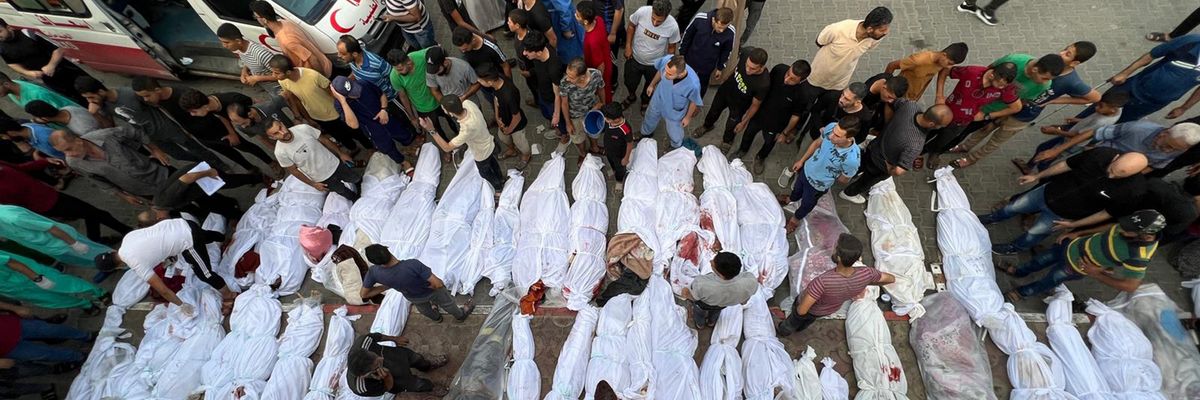Israel's war on Gaza has killed more than 11,000 Palestinians, including over 100 civilian victims of a single Israeli bombing in the densely populated Jabalia refugee camp on October 31 who were publicly identified on Thursday by the U.K.-based watchdog Airwars.
The group identified 116 names of civilians killed in the strike—including 10 cases with the death of multiple family members, three of which reportedly involved entire families being wiped out. The estimated civilian death toll is 126-136, including 69 children.
Airwars noted on social media that this is "the most named victims we have ever monitored in a single event," and "almost every named victim we found died along with at least one other family member."
The analysis is just for the Israeli attack on October 31, but the group is separately reviewing a strike from the following day. The
Israel Defense Forces (IDF) confirmed both bombings and
claimed to be targeting "a very senior Hamas commander."
As Guardianreporting cited by Airwars detailed:
A spokesperson for the Israeli military said the attack had been authorized to assassinate a senior Hamas commander and destroy his base. IDF spokesperson Daniel Hagari named the target as Ibrahim Biari, commander of Central Jabaliya Battalion, who he said had been leading fighting in northern Gaza from a network of tunnels under the camp.
Hagari declined to comment on how many munitions, or which types, were used to target the camp, or identify which craters were caused by tunnel collapses. He said Israel would provide some of these details at a later date.
But a visual analysis by The Guardian has identified at least five craters in the densely populated refugee camp, which weapons experts said were left by the use of multiple JDAMs—joint direct attack munitions—in the airstrike.
"Hamas spokesperson Hazem Qassem denied any senior commander there and called the claim an Israeli pretext for killing civilians," according toReuters.
Ahmad al-Kahlout, a spokesperson for the Hamas-controlled Gaza Interior Ministry in Gaza, told reporters at the time that "these buildings house hundreds of citizens. The occupation's air force destroyed this district with six U.S.-made bombs. It is the latest massacre caused by Israeli aggression on the Gaza Strip."
Hagari claimed the IDF killed "scores" of militants alongside Biari.
"With ambiguity around the exact number of militants killed, Airwars has applied a 12-24 combatant casualty range to account for comments such as 'dozens' of targets killed," the watchdog said.
Those in the camp remain at risk. Middle East Eyereported Wednesday that "renewed heavy Israeli shelling has targeted residential homes in the Jabalia refugee camp. Footage showed blocks falling to the ground and survivors digging in the rubble with their hands to retrieve dead bodies."
The IDF strikes on Jabalia have been globally condemned as war crimes—as have various other Israeli actions since October 7, when the nation launched what experts are calling a "genocidal" war in response to a Hamas-led attack.
Throughout Israel's bombing campaign and ground operations in Gaza—which along with killing and wounding thousands of civilians have destroyed civilian infrastructure and displaced around three-quarters of the population—global calls for a cease-fire have mounted.
There have also been growing demands for International Criminal Court action. Rutgers Law School professor and Just Security executive editor Adil Haque tagged the ICC prosecutor, Karim A. A. Khan, in a social media post about the Airwars analysis.
Khan last month asked civil society groups "to send us any and all evidence that underpins their reports or their communiques or their notices that they issue" on Gaza, explaining that "reports by themselves are, of course, not evidence and I cannot and will not act pursuant to my oath of office without reliable evidence that we can validate that can stand up in a court of law."

